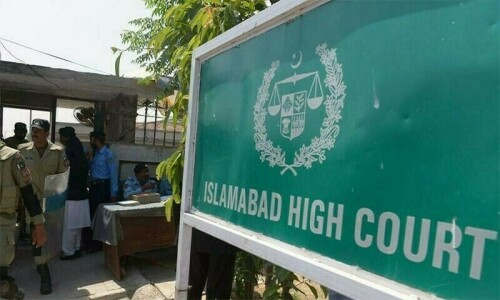MANILA, April 9: Pakistan, Afghanistan and Turkmenistan formally invited India to join a natural gas pipeline that will pass through some of the world’s most rugged terrain, the Asian Development Bank said on Wednesday.
But Indian officials seemed cool to the proposal.
“Because Pakistan falls on the route of the pipeline, we are very concerned about safe delivery of gas through this pipeline,” an official from India’s oil ministry, who asked not to be identified, told Reuters in New Delhi.
The Manila-based bank, which is hosting a meeting of the oil and gas ministers of the three countries to discuss logistics and funding details of the project, said India was being asked in a formal letter to participate both as an investor and a buyer of the gas.
The 1,600km pipeline — which would begin in the world’s fourth-largest gas field in southeastern Turkmenistan — is expected to cost $2 billion to $2.5 billion and take three years to build.
“It has significant potential to improve stability and raise living standards in south and central Asia,” the bank said.
The letter also requests India to invite the ADB to make a presentation on the project and related issues, including the approach towards mitigating risks and security concerns.
India imports more than half of its billion-plus population’s energy needs and its participation in the project would make it more viable, analysts say.
Pakistan had said previously that India was a logical market for the gas carried by the massive pipeline.
Nourez Shakoor Khan, minister of petroleum and natural resources, told a news conference that security would be “the responsibility of each participating country” and that the project would be viable “even without India’s participation”.
He said the feasibility study was expected to be completed by September. The main players intend to form a consortium and may invite private companies to invest, he added.
The pipeline will carry up to 30 billion cubic metres of natural gas per year from Turkmenistan’s Dauletabad fields to northern India, Pakistan and Afghanistan, as well as to Arabian Sea ports for shipment to other Asian markets.
Turkmenistan, a land-locked former Soviet republic, is keen to find alternate markets to cut its dependence on Russian pipelines and buyers.
“The revenues generated from this project will help improve the infrastructure inside the country and also invest into the prospecting of new fields and develop existing fields,” said Tachberdy Tagiev, Turkmenistan’s minister of oil and gas.
He said the project could be completed by 2006 once the feasibility study had been finished.
The three countries have yet to discuss the ownership structure and how much equity would be sold to private companies.
The ADB, which gave a $1 million grant to finance the feasibility study, said it would submit draft transportation, sale and purchase agreements to the ministers within 10 days.
The next meeting of the project’s steering committee — its sixth — is due to be held in Ashgabat, Turkmenistan at the end of May.—Reuters












































Dear visitor, the comments section is undergoing an overhaul and will return soon.